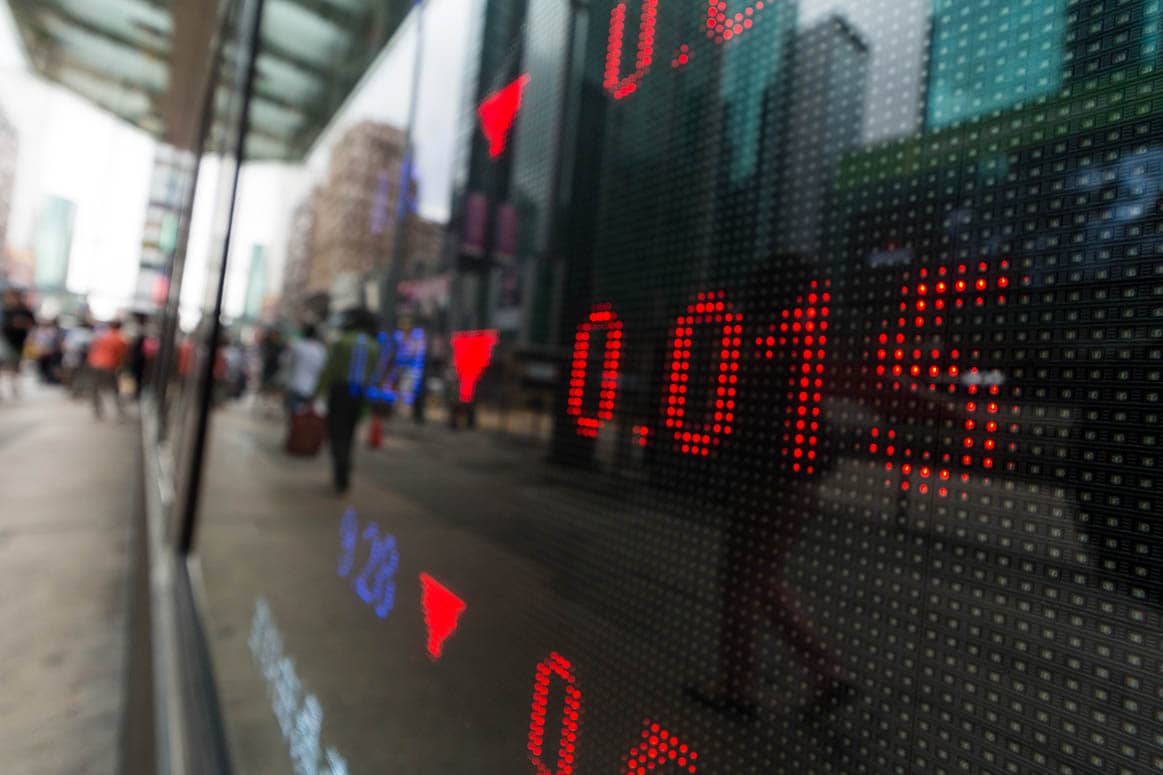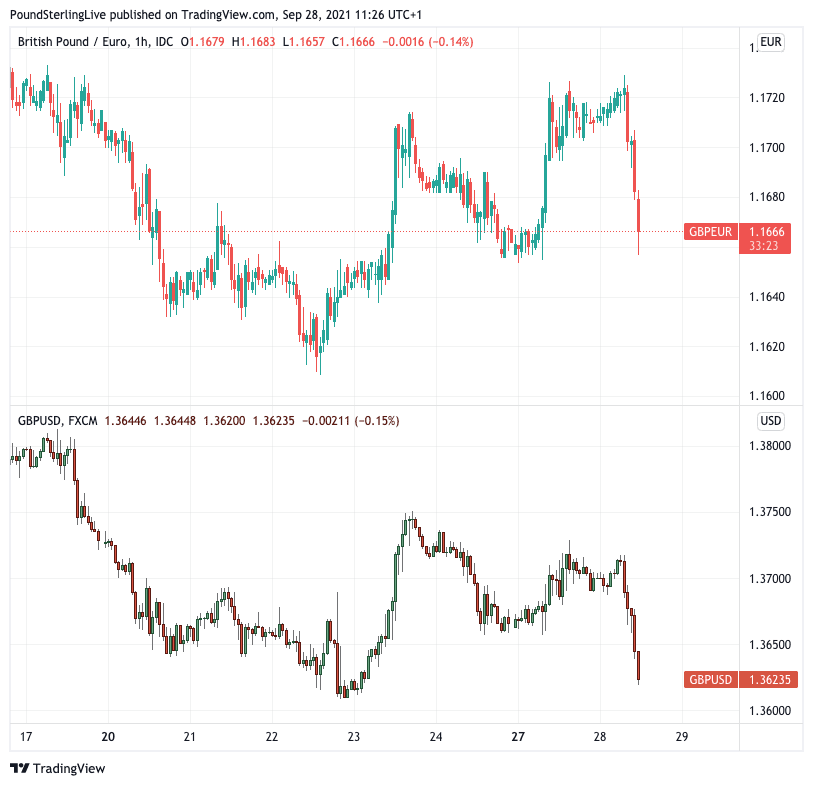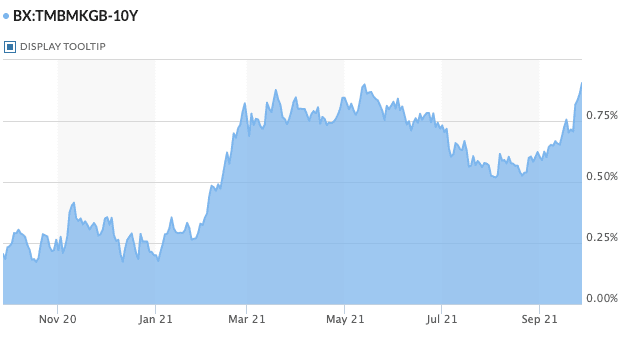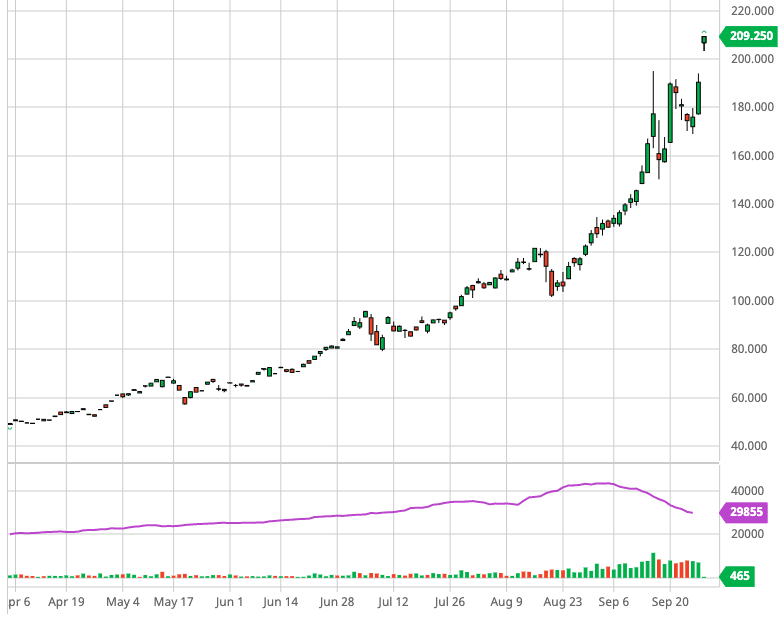Pound Sterling Hit by Market Sell-off, Energy Crisis Cited
- Written by: Gary Howes
- Market drawdown hits GBP
- Comes as UK gas prices surge to record highs
- Global economy faces energy crisis
- Global inflation heading ever higher

Image © Adobe Images
- Market rates at publication:
GBP/EUR: 1.1584 | GBP/USD: 1.3531 - Bank transfer rates:
1.1360 | 1.3250 - Specialist transfer rates:
1.1526 | 1.3463 - Get a bank-beating exchange rate quote, here
- Set an exchange rate alert, here
The British Pound was sold against the Euro and Dollar as global investors dumped stocks and high yielding assets in the face of increasing fears that inflation was heading higher for a protracted period amidst a global energy crisis.
But the Pound was easily the worst performing of the world's major currencies suggesting there were some genuine UK-specific factors bothering investors.
A surge in UK gas prices to record highs combined with a run on fuel station forecourts by panicked consumers point to a combination of weakening growth and rising inflation; a potently negative cocktail for the economy.
The Pound-to-Euro exchange rate fell by over a percent to quote a daily low at 1.1573 and the Pound-to-Dollar exchange rate fell by over 1.25% at one tage to quote at 1.3530.
"The pound has weakened severely against the euro today due to the ongoing energy crisis," says Charles Purdy, CEO of Smart Currency Exchange. "It’s not just a shortage of fuel on the garage forecourts: the sharp rise in gas and fuel prices has led to worries about rising inflation and economic slowdown."
Above: GBP/EUR hourly (top) and GBP/USD hourly (bottom).
"GBP is the big loser among FX majors today," says Danske Bank. "Domestic developments, negative supply shock, soaring power prices are only making matters worse for the pound which suffers from riskoff in global markets."
The latest headache for global investors - not just those looking at the UK - is the surge in global fuel and energy prices, which have raised the spectre of an extended period of high inflation levels.
This has in turn prompted fears that central banks will be forced into raising interest rates in order to ensure higher inflation levels do not become entrenched over the medium-term, as suggested by the Bank of England's Governor Andrew Bailey on Monday.
The result is higher UK bond yields as investors demand greater compensation for holding long-term debt and anticipate higher interest rates at the Bank of England.
Secure a retail exchange rate that is between 3-5% stronger than offered by leading banks, learn more.
Now typically under benign market conditions this could be beneficial to Sterling valuations, as we reflected in a piece published on Sept. 28.
But, when we wrote the piece the Pound was moving higher as UK inflation expectations grew.
What has changed in the interim is the market's mindset: the prospect of high inflation, higher interest rates and stalling growth is a bad combination, triggering a fall in stocks that has dragged down the Pound.
A key ingredient in the market's recent shift in market perception is Chair of the U.S. Federal Reserve Jerome Powell who will reportedly tell U.S. senators on Tuesday that he believes inflation will stay elevated for a longer stint than previously expected.
Powell will offer this expectation as a justification for signalling last week that a reduction in the Federal Reserve's quantitative easing programme would likely commence in November (tapering), with the programme now likely to be completed by mid-2022.
The yield paid on U.S. government and corporate bonds have risen as a result, raising the costs of financing which will in turn further slow global growth and make investors nervous.
The Pound will likely remain vulnerable amidst such a backdrop.
{wbamp-hide start}
{wbamp-hide end}{wbamp-show start}{wbamp-show end}
But domestically, the UK economy faces increasingly severe headwinds given the country is looking particularly prone to the energy crisis and potential stagflationary conditions.
UK wholesale gas for October delivery has surged to a fresh high on Tuesday, suggesting the energy crisis facing the country is only deteriorating.
Analysts say the developments come amidst intense bidding between Asia and Europe for any available seaborne gas.
"The latest surge in LNG spot prices reflects strong demand from China and Europe. Growing fears of an energy shortage in China this winter have led to Sinopec, one the largest LNG importers, to outbid European rivals," says Vivek Dhar, Mining & Energy Commodities Economist at CBA.
"Importers in North Asia, particularly China, are keen not to repeat their experience from last winter, where colder than usual temperatures and a scarcity of LNG cargoes resulted in LNG spot prices spiking higher," he adds.
But the UK enters the winter period with storage capacity virtually depleted, compared to major European economies which enter the crisis with more stocks available making the situation in UK gas markets particularly acute.
Above: UK gas prices for the October delivery contract. Image courtesy of BarChart.
As of last week the UK stored enough gas to meet the demand of four to five winter days, or just 1% of Europe’s total available storage.
By contrast, the Netherlands meanwhile has capacity more than nine times the UK’s, while Germany’s is 16 times the size.
The UK's limited gas storage came just as a dash for gas got underway right across the globe as economies recovering from the Covid crisis ran into disjointed supply chains and commodity markets which were in turn amplified by the crisis.
The UK consumer is now facing a jump in energy prices as Ofgem is expected to raise the price cap in February once again, a development that promises to fuel fears that high inflation will last for an extended period.
Rising energy prices will add to inflation that is already expected by the Bank of England to peak at 4.0% later this year, although the Bank has now suggested these already lofty levels look too low.
"Ongoing energy price shocks risk keeping inflation above the BOE 2% target rate for longer," says George Buckley, an economist at Nomura.
"A theme seems to be developing here, and we think the risk is that the Bank of England may begin to see recent trends in energy and global costs as compromising medium-term price stability," he adds.
The UK therefore faces higher inflation, higher interest rates but low growth, which can only be a negative for the Pound.
"Tightening monetary policy too early would additionally slow down the recovery," says Esther Reichelt, FX and EM Analyst at Commerzbank.
"We therefore see little further GBP appreciation potential. After all, the longer the supply bottlenecks persist, the more endangered the economic recovery will be and the less likely a significant tightening of monetary policy will become," she adds.








